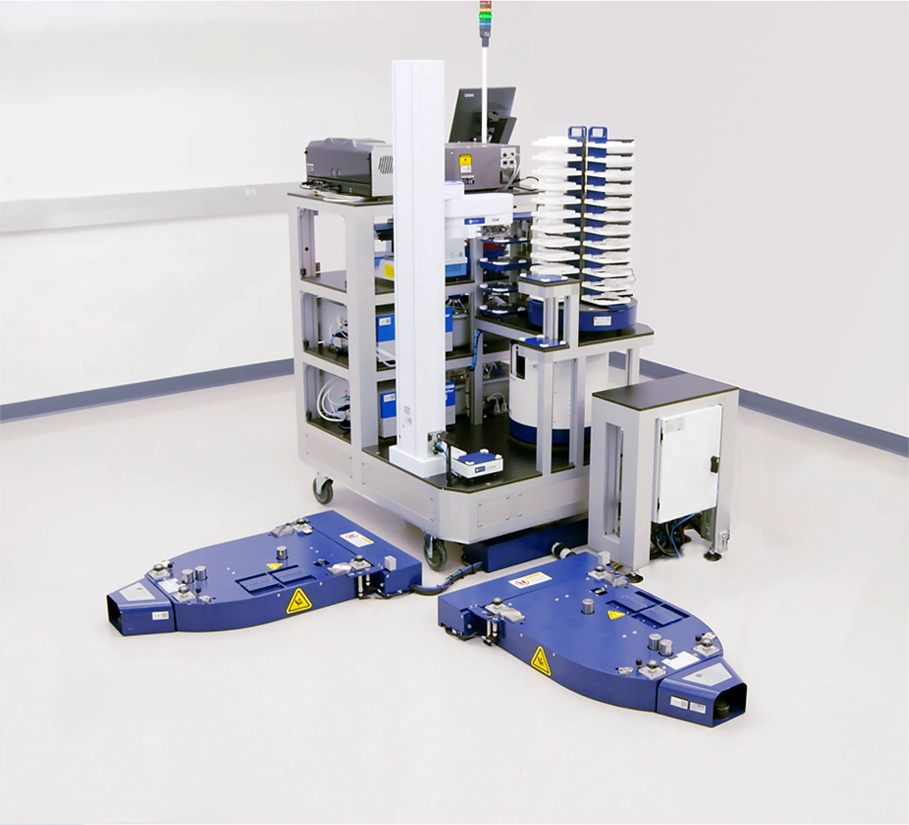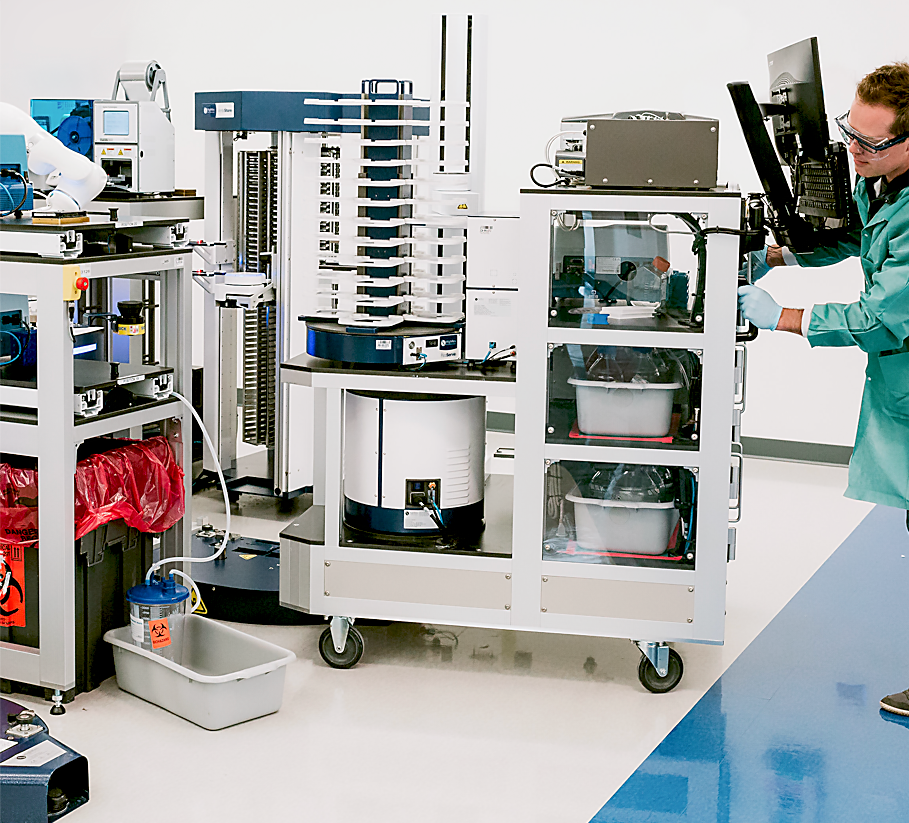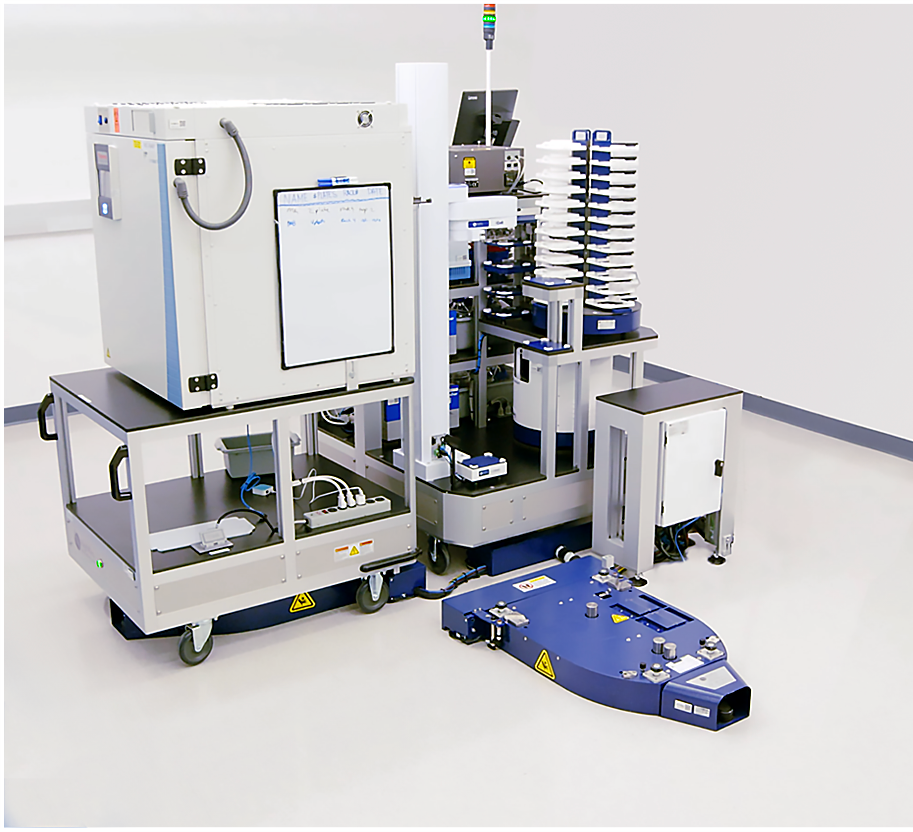The David H. Koch Institute for Integrative Cancer Research at MIT has selected HighRes Biosolutions to implement modular and flexible automation for its newly implemented screening facility. HighRes will provide The Koch Institute, which is revolutionizing the diagnosis, monitoring and treatment of cancer, with two screening systems that will be linked using HighRes’ patented dockable cart-based automation platform. Investigators at the Koch Institute as well as other MIT affiliates will use the new systems for both genomic and biochemical approaches to fighting cancer with a particular interest in studying combination treatment synergies.
The first HighRes system will be dedicated to a cell culture-based genomic approach to oncology. The self-contained system will generate thousands of discrete lentiviral constructs targeting a multitude of genomic locations. Using RNAi technology, these specialized viruses enable researchers to selectively “knock down” the function of specific genes and proteins in cancer cells, resulting in the identification of pathways and individual disease contributing factors for various forms of cancer.
The second HighRes system will be used for more typical biochemical and compound screening strategies. This multifunctional, fully-automated system will be equipped for quantitative biochemical and protein assays, high-content imaging studies and compound screening for lead drug discovery. Besides integrating liquid handlers, plate washers/dispensers and various end point readers, the system will maintain proper sample handling throughout any process with the use of barcode readers.
These biochemical and genomic screening systems will be physically linked through mobile storage devices via HighRes’ cart and dock-based automation platforms. The ability to dock and undock virtually any integrated device allows for quick and simple interaction between automation platforms and the rapid reconfiguration of systems to perform nearly any assay. This flexible and modular approach to automation also enables researchers at the Koch Institute to conduct all assay development on the same devices (either online or offline) that eventually will run their high-throughput screens.
“Bringing in advanced automation to support the experimental needs of our oncology research community represents an important milestone for us. These customized and yet highly flexible facilities paired with biologically-validated compounds and reagents will provide important new platforms to support the broad research interests of our MIT community,” explains Robert Urban, Executive Director of the Koch Institute at MIT.
“We are excited to have some of the best cancer researchers in the world working with our systems.” explains Chris Pacheco, Director of Life Science Technologies at HighRes Biosolutions. “I truly believe this group of biologists will be able to fully appreciate our flexible approach to laboratory automation and will take full advantage of its benefits in unforeseeable ways. We’re excited to see how our systems will adapt to their experimental designs.”
About the Koch Institute
The David H. Koch Institute for Integrative Cancer Research (pronounced “coke”) is a cancer research center affiliated with the Massachusetts Institute of Technology (MIT) located in Cambridge, Massachusetts. The Institute is one of six National Cancer Institute-designated basic research centers in the US. The Koch Institute (KI) was launched in October of 2007 and is physical home to ~25 MIT faculty members from both the Schools of Engineering and Science and convenes over 1,000 researchers from across the MIT campus. KI fosters and funds interdisciplinary collaborations in five key research areas: nanotherapeutics, detection and monitoring, metastasis, mapping drug sensitivity & resistance pathways, and cancer immunology.
About HighRes Biosolutions
HighRes Biosolutions, Inc. (www.highresbio.com) is the leader in the design and construction of innovative robotic systems and laboratory devices used by pharmaceutical, biotech, and academic research laboratories. HighRes accelerates drug discovery, high throughput genotyping, siRNA screening, next-generation sequencing sample prep, biorepository science and molecular diagnostics with highly flexible, expandable and modular integrated systems, bench-top devices and consumables that are easily configured (and reconfigured) to create research environments conducive to achieving breakthrough results.
###


